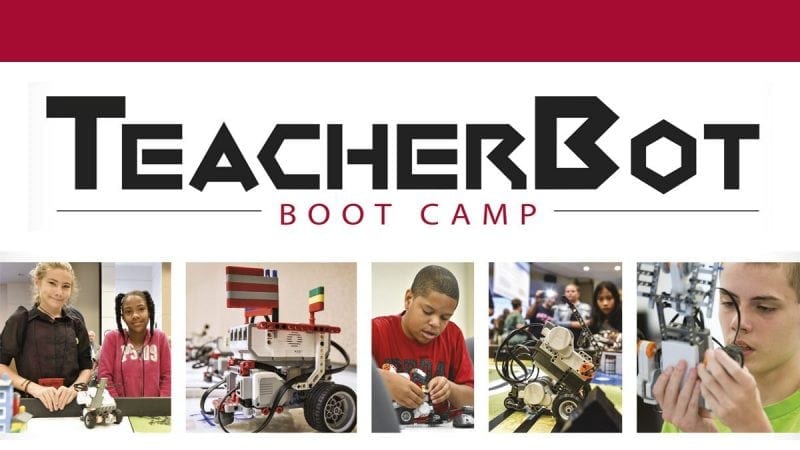Polk State, FIRST LEGO League get teachers excited about robotics

School may be out for the summer, but class was in session last week for teachers and Polk State College Education students who participated in TeacherBot Boot Camp.
The program is designed for elementary and middle school teachers to receive hands-on training in robotic building and programming from FIRST LEGO League partners that they can take back to their classrooms.
“The boot camp has experienced an internal and external boost this year thanks to the actions of our affiliate partners, support from Polk State’s Education Program, and the community partnerships Naomi Boyer has developed,” Administrative Assistant Christy Canady said, noting that participation this year more than doubled from last year.
Boyer, Polk State’s Vice President of Special Projects, Strategic Priorities, and Growth, launched TeacherBot Boot Camp last year with the College’s FIRST LEGO League affiliate representatives, Michael Schweim and Joyce Walters.
“Robotics education increases student interest in STEM (science, technology, engineering, and math) fields, engaging students in fun active learning that lights a spark to bridge challenging curriculum with real, practical application,” Boyer explained. “By expanding teacher knowledge and capacity, the seeds are being planted to grow a foundation for transformational educational experiences.”
The boot camp is made up of two tracks. LEGO WeDo: Robotics Through Simple Machines for instructors of students ages 6 to 10, and LEGO Mindstorm: Robotic Engineering for instructors of students ages 9 to 14. This year, two sessions of the LEGO Mindstorm track were offered to respond to the increase in boot camp enrollment.
The program serves teachers from eight counties, but the majority of participants are from Polk County schools. And this summer, 13 students enrolled in Polk State’s Engineering for Elementary Learners course also participated in the boot camp, which is held the first week in June at the Polk State Center for Public Safety.
Walters led the LEGO WeDo group in a warm-up exercise, asking the students to use pipe cleaners and their imaginations to create something out of the material to express something about themselves to their peers.
Polk State student Sarah Murray made a firefly, “because I want to light up the minds of young children,” she said.
Students Mario Saldana and Alexandra Ujilaki had similar themes.
“I made a key because as future educators, we hold the key to educating the next generation,” Saldana said.
“I made an apple because I may be the least creative person in this classroom,” Ujilaki joked.
The activity got their minds going for what was to come – programming the Glowing Snail.
“Similar to using a LEGO kit in your classrooms, these activities get the minds going and you can integrate different subject areas, such as having them write stories about what they created with their pipe cleaners,” Walters explained.
“By expanding teacher knowledge and capacity, the seeds are being planted to grow a foundation for transformational educational experiences,” Polk State Vice President of Special Projects, Strategic Priorities, and Growth Naomi Boyer said.
Across the hall, Schweim led a group of teachers from Lake Alfred Polytech Academy, a magnet school with a focus on its robotics program.
“This is what education should be,” said Schweim, a robotics teacher at McKeel Academy of Technology. “Education should be hands-on and collaborative, and allow students to work on long-term projects in which they experience trial and error, develop communication and soft skills, and learn to critically evaluate problems and come up with solutions.”
“This allows students to become not only educated, but also innovative,” he added. “We believe this boot camp empowers teachers to become educators of the 21st century, giving them the confidence they need to implement robotics into their lessons.”
Walters echoed a similar sentiment.
“These teachers and Polk State students are the generation that will help us get robotics into as many classrooms as possible,” she said. “We are proud to work with Polk State and community partners to make that happen.”

